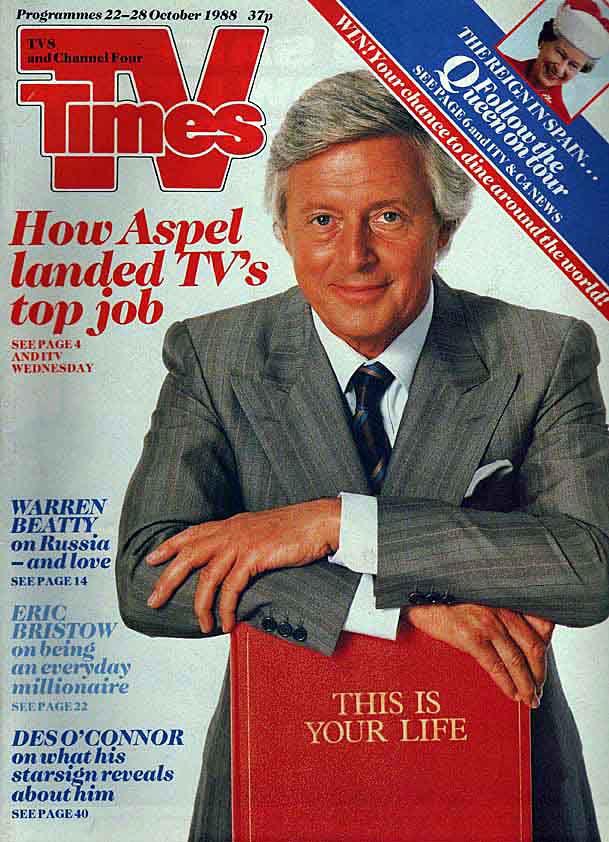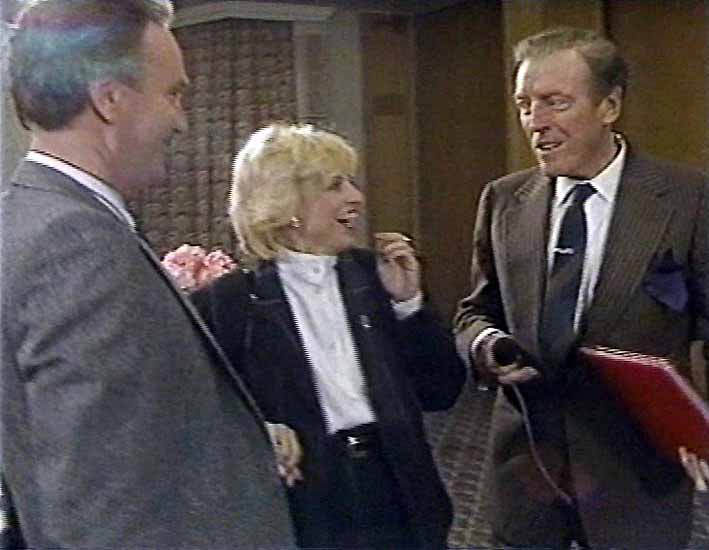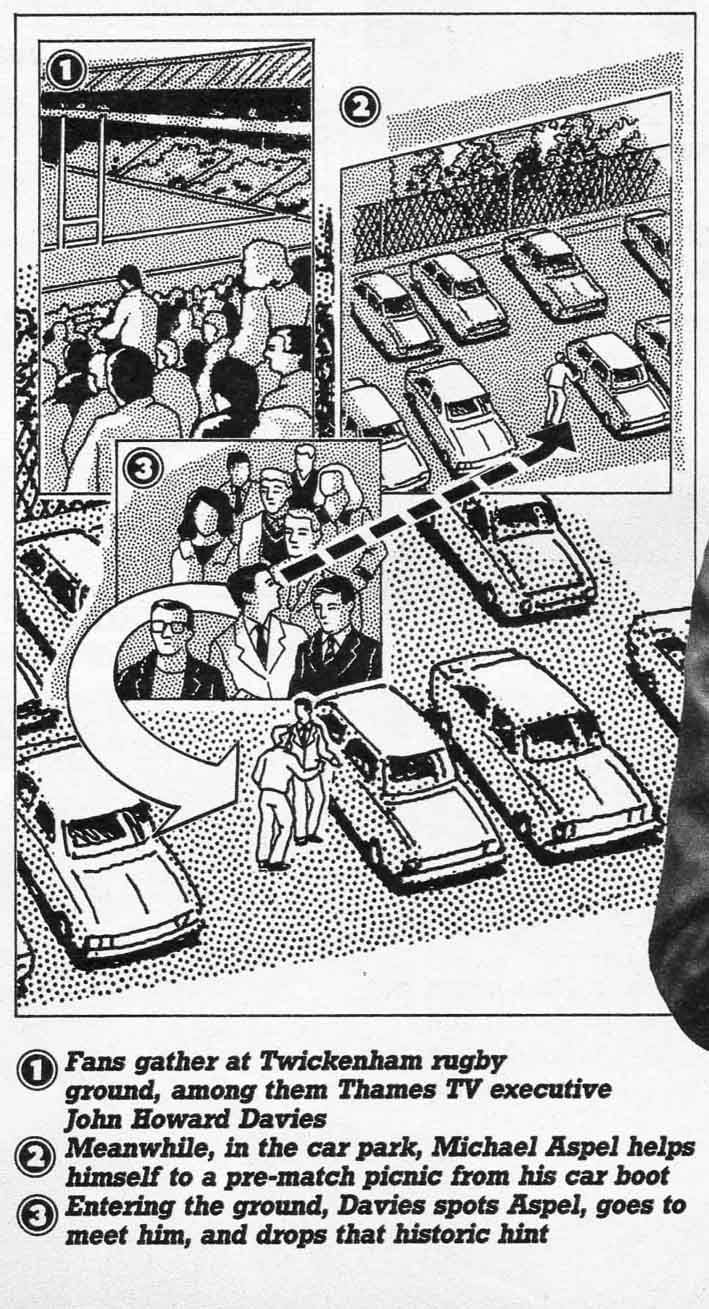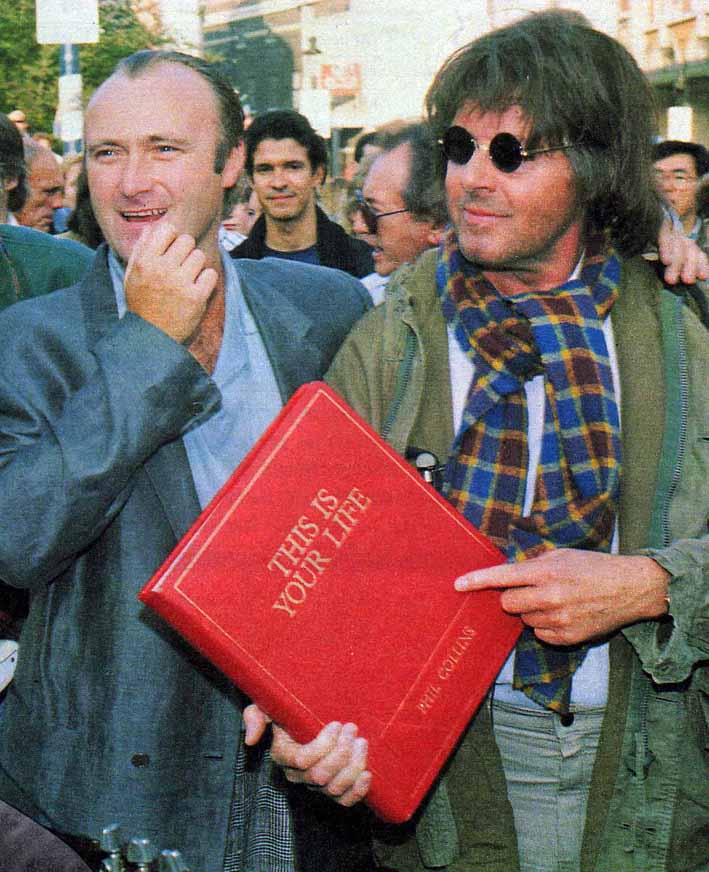Big Red Book
Celebrating television's This Is Your Life
New Lease of Life

Roy Bottomley, former national newspaper journalist, television news editor, producer and writer of television comedy, drama and documentaries, was involved in every This Is Your Life edition from when the series began broadcasting on ITV in 1969 until 1995.
In his book This Is Your Life: The Story of Television's Famous Big Red Book, published in 1993, Roy recalled how the untimely death of original and long-time presenter Eamonn Andrews in 1987 put the future of the programme in doubt; but following a successful and high profile search for a new presenter, the programme began a new lease of life and went on to enjoy continuing success...
related pages...
a brief biography
a career review
the programme's icon
the producers who steered the programme's success
the show's fifty year history
the man who created it all
Press coverage of the death and memorial service of Eamonn Andrews
Andrews's death casts doubt on his show
The Guardian reports the death of Eamonn Andrews
Press speculation and announcements on new presenter Michael Aspel
TV Times interviews new presenter Michael Aspel
In those hours, days, then weeks after Eamonn's death, I was often interviewed on television, on radio or in the press about him, a man who had truly been a broadcasting legend. The burning question was always the same: does his passing away mean the death of Life?
To be honest, I thought it did. Having worked with Eamonn for twenty-four years, going back to the time of his departure from the BBC, I thought ITV would kill off the Life.
My wife, Patti, questioned this. She reminded me that I had worked behind the scenes to ensure the continued success of the programme when many people thought it had outlived its welcome, and indeed its supply of subjects, its lifeblood. She also pointed out that I had never subscribed to this view, always believing firmly that This Is Your Life was and remains a self-regenerating concept. Stars, legends, heroes and heroines of one decade make way for those of the next. And the Life should be there to honour them.
Had not Life's creator, Ralph Edwards himself, been so taken with the massive popular success of the programme in the UK that he had brought it back to American screens for another successful run? And was Life not also a hit in Australia, New Zealand, Spain, Holland and Germany?
I sat down in my study and thought about what my wife had said.
Next day, I rang producer Malcolm Morris. He was thinking along the same lines.

Eamonn's last recorded edition of This Is Your Life - for Crossroads actress Jane Rossington - was broadcast several weeks after his death
Meanwhile, we were only one month into a projected twenty-six-week season. Thames Television took the decision to repeat some Eamonn 'classic' Lives, plus the few programmes he had recorded just before his death. Then, at a tasteful interval after Eamonn's memorial service, at which there was a 'Who's Who' turn-out of the biggest names in the nation, from show business to politics, sports to the arts, Thames made it clear the company would like to keep the Life alive.
But this would not be until the following autumn season, starting in September 1988. That was many months away. After the shock of Eamonn's death started to subside, the nation had a new guessing game.
From schoolroom to bar room, factory floor to the City, building site to Women's Institute and around every television set in the land, just about everybody knew who would replace Eamonn, whose hands would turn the pages of the Big Red Book. Our telephones were red hot with suggestions, and not only from show-business agents and managers. Viewers too, felt they had the one and only name. One or two 'names' even rang to suggest that they were the one to replace the Big Fella, among them several former subjects.
One lobby was for choosing a female host and I must confess I was not averse to this. Gloria Hunniford was on my shortlist. Naturally, the name of Terry Wogan came high on anybody's list. He had not hesitated to come along to the studios of the 'opposition' to present the tribute to Eamonn on the day of his death, and he had delivered, as usual, an impeccable, professional appearance. After that, we thought Terry would be favourite. Of course, he was still very much a BBC man, and under contract. But then, so had Eamonn been until he decided to quit and join ITV.
The guesswork continued. Michael Parkinson said he would not want the job, and suggested Frank Bough. Noel Edmonds, Leslie Crowther and Russell Harty (who was to die in June) were also tipped to be among the runners heading for the finishing post. Derek Jameson, who was presenting Headliners, hinted to me he would like to be in the frame.
I recalled once asking Eamonn if he had ever thought of who might step into his shoes. He grinned and said, 'Mike Yarwood?'
He had always thought Mike's impression of him was brilliant.
How Eamonn's successor was finally found was worthy of a Life surprise pick-up at its best.
The scene was Twickenham, headquarters of the Rugby Football Union. February 1988, and the crowds were gathering for the England-Wales international.
Michael Aspel is a keen rugby fan and a self-adopted Welshman. His broadcasting career began in Cardiff, so his Welsh accent is impeccable and also hilarious.
Another Welsh supporter in the crowd that day was John Howard Davies, the former child actor (he was Oliver in the 1948 film of Oliver Twist) who became an award-winning director/producer at the BBC with comedies such as The Good Life.
He had joined Thames Television as Head of Light Entertainment. If Thames were to continue with a new series of This Is Your Life in the autumn, it would be his responsibility to choose the new presenter, Eamonn's successor as custodian of that famous Big Red Book.
Like thousands of others that day, Michael had brought a picnic lunch in the boot of his car. He was about to tuck in when who should spot him but John Howard Davies.
Casually, John said to Michael, 'Love to have a chat with you sometime.'
Michael knew exactly what he meant. The plot thickened.

How TV Times magazine imagined the meeting between Michael Aspel and John Howard Davies at Twickenham rugby ground
Of course, the name of Michael Aspel had been mentioned in the course of our discussions, but was it a real possibility? After all, he was under contract to London Weekend Television for his chat show. It was very unusual for one company to release a contract artiste to another company, even within the ITV network.
But a cloak-and-dagger operation of This Is Your Life-style secrecy was under way. John Howard Davies let producer Malcolm Morris in on the secret, and Michael's agent was contacted. Talks went on at Michael's home in Esher. Eventually a 'package' was agreed by all concerned, including, of course, London Weekend. It meant Michael would continue to present Aspel and Company at the weekend as well as twenty-six Wednesday night Lives.
The official announcement came in March, five months after Eamonn's death. How much money would the 'package' be worth to Michael? With a verbal body-swerve that would have lit up Twickenham, Michael told the assembled press, 'A great deal less than you are going to print.' When we were introduced, Michael told me, 'My great fear is the subjects will look at the book and say, "Oh, thank you, Eamonn."' His fears proved groundless when he sprang his first surprise.
Mind you, international rock star Phil Collins could have been forgiven for not recognising the man who confronted him in Covent Garden as anyone from television.
We persuaded the normally immaculate Michael to become a Covent Garden busker - unshaven, shabbily dressed, and wearing a wig of long, greasy hair. We also persuaded some big stars - Bob Geldof, Midge Ure and Howard Jones - to become buskers for the afternoon, so that the scruffy Michael could hide behind them. They were also part of our insurance: we had been tipped off that Phil Collins might do a runner if he saw the Big Red Book, so we hoped his pals from the rock scene would stop him! Phil was taken to Covent Garden for an interview with an American television company about his latest film, Buster, based on the Great Train Robbery. That was our white lie.
When our own director and his production assistant arrived in Covent Garden to supervise the hoped-for pick-up, a scruffy, bearded figure shuffled towards them.
'Hello' he growled.
They looked at each other. Surely no one they knew.
'Gotcha!' beamed Michael. They simply hadn't recognised him.
And if they were surprised, Phil Collins was absolutely stunned when the scruffy old busker produced the Big Red Book - for his first time - from under his tatty anorak. Phil was so taken aback he looked as though he couldn't have done a runner if he had tried.

For his first This Is Your Life as presenter, Michael Aspel took on the guise of a scruffy old busker to surprise Phil Collins in London's Covent Garden
To everyone's relief - especially Michael's - try he didn't, and it was the new lease of Life that was up and running.
But all the pre-pick-up activity in Covent Garden - where so many media firms have their headquarters - had led to a press tip-off. Michael as a busker was irresistible to Fleet Street, and our pick-up made page one pictures just about everywhere next day.
So it looked as though the viewers would now know the identity of Michael Aspel's first This Is Your Life subject. This we could not allow; it would dampen the big surprise element. Of course, the Phil Collins programme would be transmitted later in the series – it was a wonderful Life – but someone else would have to be chosen for Michael's debut with the Big Red Book.
At that time, Hollywood and Broadway legend Mickey Rooney was opening in the West End with his American hit musical Sugar Babies. Nothing could have been sweeter for us than when we got the nod to mount a Life on Mickey. Researchers set out to find Mickey's children from all nine of his marriages. They flew in to London on the night, 11 October 1988, and followed Michael Aspel on stage at the Savoy Theatre at the curtain call for Sugar Babies.

Michael Aspel surprised Hollywood and Broadway legend Mickey Rooney on stage at London's Savoy Theatre
By this time, Mickey Rooney's story had reached the proportions of the most far-fetched musical script.
Sugar Babies was based on burlesque - a saucy American form of revue - and couldn't have been more appropriate for Mickey, because his mother was a burlesque chorus girl and his Edinburgh-born father the 'top banana' (the show's main attraction). When his parents' marriage broke up, the young Mickey moved with Mum to Los Angeles. There he made fifteen films in four years as the all-American youngster Andy Hardy.
He also made National Velvet with Elizabeth Taylor, who wrote from her sickbed a letter for Michael Aspel to read on the programme.
Wrote Elizabeth: 'National Velvet will always be one of my favourite films because I worked with one of the dearest, warmest and most giving human beings - you. All my love, Elizabeth.'
Ann Rutherford, his screen girlfriend in the Andy Hardy films, flew in, as did Donald O'Connor, legendary star of great movie musicals and Mickey's mate for forty years. We showed film of the two of them at Judy Garland's fifteenth birthday party in 1937.
We brought back memories of the film he made with Spencer Tracy fifty years before: Boys' Town, based on a true story of a priest who started the 'town' in Nebraska. We filmed there to show its work now.
Vic Damone, George Peppard and Anthony Quinn all added their tributes to the much-married Mickey, who said his marriage certificate should be made out to 'To Whom It May Concern'.
But what was it that made this story compete with any flight of Hollywood fancy?
Virtually 'born in a trunk' youngster finds Hollywood stardom. His name is known the world over. His career goes into decline. By the late Sixties he is down to his last hundred dollars. Then an old Hollywood actor pal, who has become a producer and theatre owner in Miami, gets a play he wants to put on and immediately thinks of his mate Mickey Rooney. He finds him, now nearly down to his last buck.
The play is about alimony. 'I know all about that' says Mickey.
The old pal is Eddie Bracken. The play is a triumph for Mickey.
A New York producer is in the first night audience. In his briefcase is the script for Sugar Babies. It runs on Broadway for seven years. With Mickey Rooney.
You couldn't write it.
By the moment Michael presented Mickey with the book, we knew we had a great show. But would the critics think the same? And would our loyal viewers?
Today critic Daphne Lockyer summed it up: 'So great was he (Mickey) to behold I actually forgot it was Aspel's performance I was meant to be reviewing. But, then, it's really a compliment to Aspel if I say that I barely noticed him at all. It shows he is doing his job.'
She went on: 'It was Eamonn Andrews' skill as well never to steal the limelight, but to train it on whoever appeared on his show. And Aspel has quite brilliantly taken over that mantle.'
Others echoed that view. And when the letters started to come in from the viewers, it was clear that John Howard Davies had done a perfect tackle in the Twickenham car park.
So, the transition from Eamonn to Michael had been made. But I have to say it was not without a great deal of head-banging or, rather, typewriter-banging on my part.
When I sat down to write the first scripts for Michael, it was Eamonn's voice I still had in my head. After twenty-four years, what else? I had consciously to remind myself of Michael's very special style. 'Laid back' is what many critics like to call it. Myself, I think it is 'quirky', a quirk being defined by the Concise Oxford Dictionary as 'trick of action or behaviour; twist or flourish in drawing or writing'.
Well, one of Michael's earliest ambitions was to be a cartoonist, and I had to bring that 'quirky' concept to the page. Once it was there, he built on it.
On the Mickey Rooney show, introducing our emotional closing guest (for Eamonn, a moment of deep sincerity and drum-rolls. and he would demand it was written as such) Michael said, 'Yes, it's Mickey and Donald' - bringing on Donald O'Connor, flown in from Hollywood.
'Sounds like something out of Wait Disney' beamed Aspel.
Wrote one critic: 'Tears of laughter or tears of sentiment - by this stage I can tell you I barely knew.'
I was to enjoy many tears of laughter working with Michael on those early programmes. Five successful years later, I still do.
I'm often asked what the two presenters of This Is Your Life have in common.
In the best possible way, if any two men could claim to be in touch with the so-called 'common man or woman', they are Eamonn Andrews and Michael Aspel.
Both were born into working-class families. Eamonn's father was a carpenter, Michael's a commissionaire. Both had an early interest in drama, Eamonn in amateur dramatics, Michael totally absorbed by the cinema.
They had educations of a similar kind - of the old grammar school variety, Eamonn at Synge Street Christian Brothers' School in Dublin, Michael at Emanuel School in Wandsworth, where he was born.
And both started their working lives in jobs far removed from the glamorous world of broadcasting. Eamonn became an insurance company clerk. Michael worked first as a tea-boy in the office of a publishing company, then, after National Service in the army in Germany, as a bed salesman at a department store in Cardiff.
Both were frustrated actors. Eamonn even wrote plays for himself to be in. In Cardiff, Michael joined a local amateur dramatic company. And both cut their broadcasting teeth in radio.
Eamonn, a successful amateur boxer, started to do freelance night work as a commentator for Dublin's commercial radio station. So keen was he, he once handed over his broadcasting position to climb into the ring, win the next fight, then resume commentary at the ringside on the next, still in his dressing gown.
Michael, eleven years younger, got his first job in radio via the amateur dramatic society, when the local BBC station in Cardiff wanted someone who could 'do voices'
He was, and still is, excellent with accents and caricature voices, so he got the job in a children's adventure serial playing a number of different roles, including, as Eamonn put it on Michael's Life, Cardiff's James Bond of the early Fifties. The serial was called Counterspy, and Michael was the dashing hero, James 'Rocky' Mountain.
One day Michael asked the department store for time off so he could complete an episode. He was refused, but went along to the studio anyway. He got the boot from the bed department.
But a new dawn was breaking for the youthful Aspel. He started doing stints as an announcer – just as Eamonn had moved on from boxing commentaries to fronting a live theatre quiz show, later taken on tour in the UK by bandleader Joe Loss. Long before This Is Your Life, Michael had followed Eamonn on BBC Radio's Family Favourites, then on BBC TV's Crackerjack.
Most amazing of all is that Michael, a car buff, wanted to buy Eamonn's twenty-year-old Mercedes after his death. In the event he didn't - it went for auction in Dublin - but Michael bided his time until he found a similar model and bought that.
Eamonn always suffered from nerves before a show, and so does Michael. During my years on This Is Your Life I have worked with the biggest names in the business, and I know that insecurity is the name of the game. All are convinced that one day someone will tap them on the shoulder and say, in Eamonn's case, 'Hey, you, back to that gas-lit flat in Synge Street your dad had for eighteen bob a week.' Or, in Michael's, 'Hey, you, back to Wandsworth, telly's not for the likes of you!'
In a curious way, both Eamonn and Michael found a totally uncharted path to success. But no one can take away their absolute determination to go for goal the moment they had got the pass. Neither are the types to boot doors open; but once in... tenacity is the word.
But what would they really, truly, have liked to do?
Eamonn once told me his ultimate ambition was to be a black-hat 'baddie', like Jack Palance in Shane (one of Michael's favourite films). But he would like to write the part for himself, because, even towards the end of his life, he still saw himself as potential novelist and playwright He was putting off those jobs for his retirement, he told me. Once I offered to write his life story.
'Roy, I couldn't let you do that. You'd tell the truth.' He puffed on his Havana, and grinned the famous grin.
And Michael? He would love to knock off a few thousand words before lunch as a best-selling novelist between acting stints, preferably in the role of a rogue English lord, the black sheep of the family, who arrives in the Wild West.
In real life, he did get to act several times, once in a touring version of Noel Coward's Private Lives – in which he met his wife Lizzie. They had not been married long when Eamonn walked on the set of Michael's popular game show Give Us A Clue – with the Big Red Book.

Michael Aspel with family and friends after being handed the Big Red Book by Eamonn Andrews in 1980.
'Truly a strange and amazing experience,' Michael told me. 'But I'm delighted Eamonn gave me that Life experience, because now I know what might be going through the minds of the people I surprise.'
It must work. In the preview of the evening's viewing on 17 April 1991, the Daily Mirror noted: 'For those of us who can still remember the way Eamonn Andrews presented this show with a cheeky twinkle, it has taken some time (since November 1988) to be convinced that anyone else could really do the job... But Michael Aspel has made it his own, bringing professionalism combined with a charming lightness of touch. It can't be easy to suddenly whip out that famous Big Red Book, tell unsuspecting victims that their whole lives are about to pass before them, and then go on to keep the whole thing bubbling with just the right amounts of humour and nostalgia.'
The programme continues in America, where the national cable channel. American Movie Classics, is currently playing some of Ralph Edwards's vintage Lives - the subjects read like a list of names from Hollywood's Avenue of Stars. And in the summer of 1992 there was a special presentation at the Museum of Television and Radio in New York of an hour-long video covering the career of Ralph Edwards in production and broadcasting.
Yes. The Life has had a new lease of life.